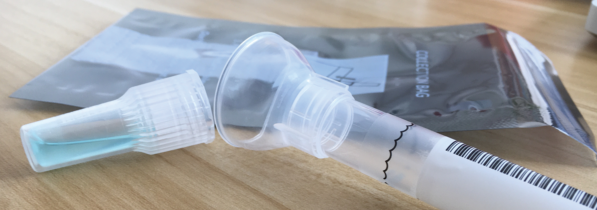
What is At-Home Genetic Testing?
Understanding what an at-home test will – and will not – tell you
For a price (typically several hundred to a thousand dollars) you can order a genetic testing kit online or by phone. You’ll swab your cheek or spit into a test tube. Then you will mail it to a lab where it may be tested for a wide variety of things — from whether you inherited your intolerance to the lactose in dairy products to your risk of certain types of cancer to if you carry a gene for a serious illness such as Cystic Fibrosis and could pass it on to your children.
There are at-home tests for:
- Traits ( e.g., male hair loss to dimples)
- Wellness (e.g., risk of certain types of cancer to restless leg syndrome)
- Ancestry reports (i.e., ethnicity and lineage)
- Carrier status (e.g., Tay-Sachs Disease to Sickle Cell Anemia)
- Paternity testing (i.e., determining a child’s biological father)
There are three general ways to get genetic testing:
- Through your physician or a genetic counselor – These are the most detailed and comprehensive tests available. They include cancer testing and testing for genetic disorders. They include large “panels,” meaning they test for the most genes.
- Physician-ordered online testing – While you can order some of the more comprehensive tests online, you will still need a physician’s approval. In some cases, your physician can order the test. In some cases, the testing company employs a physician who can order the test for you.
- Direct-to-consumer testing – These are the at-home tests you most often hear about. They do not require a physician’s order. However, they don’t fall under the same guidelines as the other two types of testing, and they may provide incomplete information. For example, they may not test for the genes you’re most interested in. Or they provide you raw data, but don’t provide guidance regarding the results and what they may mean for you or your family.
Before you order at-home genetic testing, it’s important to consider your goals for testing. It’s also a good idea to understand what a test may or may not tell you, how reliable the testing is, and whether you will receive any guidance to help you understand what the test restuls mean for you and your family. If you’re thinking about at-home genetic testing, consider the following.
Is the company trustworthy?
If you decide to order an online test, research the company providing the service. Verify that:
- The lab that conducts the tests has received one of the following certifications: Clinical Laboratory Improvement Amendments (CLIA), College of American Pathologists (CAP) or AABB. The Food and Drug Administration (FDA) is still exploring how it will address genetic testing and has approved some but not all such tests.
- The company’s staff members have received extensive education in the subject, such as being certified genetic counselors, medical geneticists, pathologists, Ph.D. geneticists, biologists or molecular pathologists.
What will the test tell you, exactly?
It’s important to fully understand the test results. You should determine:
- Exactly what is being tested (health conditions, ancestry, traits, carrier status)
- How the results will be provided
- What you will do with your results, and if they will help you make health decisions
- If you might find out information you might not be expecting
- If you plan to share your results with your family
- If the company will contact you if there are new scientific findings that may change your results
Will your personal information be protected?
Carefully review the testing company’s privacy and security policy. Be sure to find out:
- What does the company plan to do with your genetic information, now and in the future?
- Will the company share your genetic information with pharmaceutical or biotechnology companies, researchers, not-for-profit groups or public or private DNA databases?
- Will the company let you know if its policies change, or if your information is shared?
What professional help will the company provide?
No matter the results of your test, you likely will have questions. You should find out how the company plans to answer your questions.
- Is a genetic counselor or other trained professional available before or after testing to provide guidance and help?
- If so, is this service included in the cost of testing, or is there an extra charge?
- Is the professional employed by the company, or is the service separate?
- If the company does not have trained genetic professionals on staff, can it refer you to someone?
Receiving the results may produce a variety of emotions. You may be surprised, relieved, disappointed or confused. Whether you choose at-home testing or seek out testing through a medical professional, seeing a genetic counselor can provide helpful guidance.
Wishing you good health!
Mark L. Thornton, M.D.



